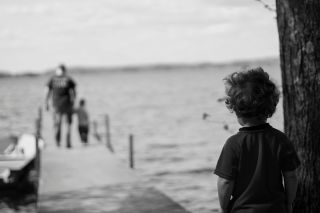Resilience
How to Survive and Thrive After a Hard Childhood
Take these steps to reckon with your past experiences and move forward.
Posted June 19, 2024 Reviewed by Monica Vilhauer Ph.D.
Key points
- Healing requires understanding that your childhood was harder than many.
- Work through your trauma and pain, potentially with the help of a certified professional.
- Don't let the events of your past define your future.

We’ve all heard that childhood is supposed to be a magical time, filled with opportunities to play, to use our imaginations, and to have carefree days not worrying about the troubles that will inevitably come with adulthood. Developmentally, childhood is a time when our brains are growing, and we are forming our perceptions of the world around us. During childhood we expect that parents will protect us from harm and shelter us from the cruel realities of society.
Unfortunately, millions of children in the US do not experience this idyllic time of life. Instead, they live through horrendous or tragic conditions in childhood, such as poverty, abuse, or bullying by their peers. Many others may experience pain and suffering through a chronic illness or a disability that begins in childhood. Still others may live through their parents’ highly contentious divorce or in a household filled with daily conflict.
If you were one of those children, this blog post is for you. It will outline some steps you can take to overcome the circumstances of your childhood and live a healthy, productive, and meaningful adult life. I'm not here to say that it's simple or easy, or even a straight and narrow path. But it's possible, and I have lived to talk about it. As a child I struggled with a medical condition that imposed limitations on what I could do and affected the way that others saw me.
The first step: becoming self-aware
Often, those of us who experienced a hard childhood lived in our version of normal. We may have witnessed others around us being happier, fitting in with peers more easily, or having happier home lives. But we may or may not have realized that our personal experience was worse than our peers or that our circumstances would be objectively defined by society as painful or even traumatic. As we get older, this starts to become clearer, as we are exposed to more people and situations different from ours. It may even be easier as we're growing up to ignore, or at least not admit, how bad our circumstances are or how much hardship we've experienced compared to our peers. This may protect us from becoming hopeless, helpless, or bitter.
But the healing process requires that we understand that our childhood was harder than most and, in many cases, traumatic. Those experiences shaped us, and it is important to acknowledge how we felt and reflect on how it affected our belief in ourselves, our confidence, and our ability to become a functional adult.
The next step: working through trauma and pain
Whether you were abused, or experienced hard, painful situations that affected your ability to live the life of a happy and carefree child, you may have experiences to process. Thinking about our childhood as an adult gives us a new perspective on how we survived, how we showed resilience by pulling through and bouncing back, and it helps us recognize any family members, friends, teachers, or others who helped us in some way. It also allows us to identify the people who hurt us, rejected us, or treated us unfairly. Some people think it’s best to leave the past in the past. But doing so keeps us from the true healing that will allow us to move forward with resolution.
There may be relationships that need to be addressed, either through having conversations with estranged family or friends, or deciding that some relationships were toxic, so we can let go of our guilt or anger. You could start by talking to siblings, parents, friends, or others who were around during your childhood about your experiences, if you trust those people to support you. Many of us may need to obtain professional help through psychotherapy, especially if there is a lot to unpack. If you were the victim of some type of abuse, seeking therapy from a trained expert in trauma treatment is recommended. You do not have to sweep your hard or painful childhood under the rug and pretend it did not happen.
The third step: set yourself free
Once you have recognized that your childhood was hard, and you have sought healing from the pain, hardship, or trauma, you can be free from that part of your life. This does not mean you never think about it again. It means that if thoughts of your childhood surface, you can process them without re-experiencing the pain. You can recognize how strong you were, and how resilient you became. You may appreciate those around you who love and support you even more.
The events of your childhood do not have to define who you are now as an adult. If your parents or others did not support you or handle your pain in ways that encouraged you, you have the ability to handle situations with your own children differently. Many people who struggle tremendously during childhood report that they are capable of much greater empathy toward others because they remember what it felt like as a child to not receive unconditional love and support.
In my professional career, I’ve supported many children as they dealt with their own medical conditions and limitations and helped them figure out how to lead a healthy life. I was able to draw on my experience to help others.
It would definitely be best if children never had to suffer from abuse, social rejection and bullying, serious illness or any other type of hardship. But because we live in a world where that is often inescapable, it is essential for those who suffered to recognize that they have survived, they can continue to overcome their trials, and they can have a healthy, meaningful life.
To find a therapist, visit the Psychology Today Therapy Directory.




